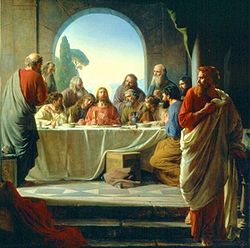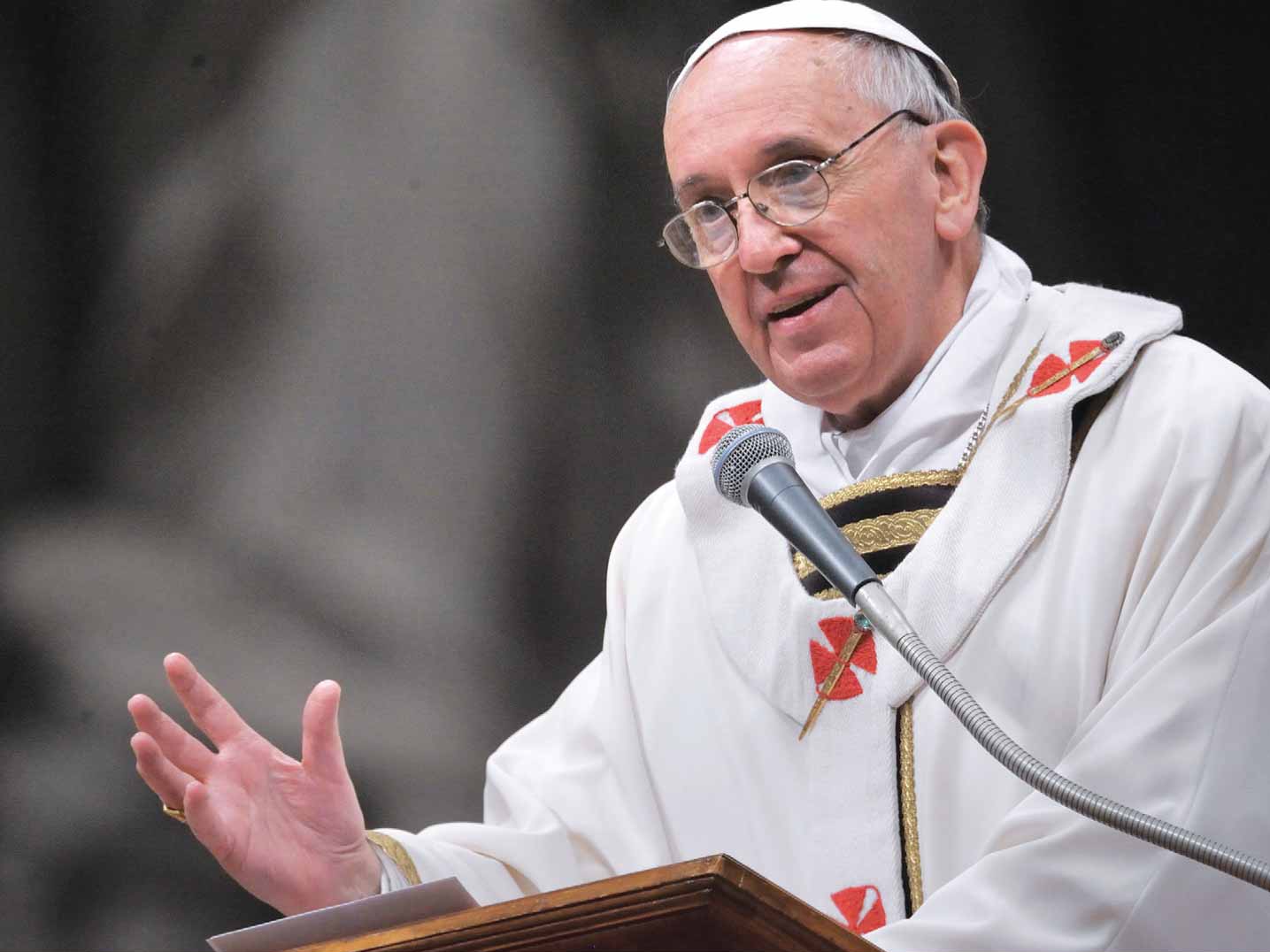Today I wish to continue my reflection on how prayer and the sense of religion have been part of man throughout his history.
We live in an age in which the signs of secularism are glaringly obvious. God seems to have disappeared from the horizon of some people or to have become a reality that meets with indifference. Yet at the same time we see many signs of a reawakening of the religious sense, a rediscovery of the importance of God to the human being’s life, a need for spirituality, for going beyond a purely horizontal and materialistic vision of human life.
A look at recent history reveals the failure of the predictions of those who, in the age of the Enlightenment, foretold the disappearance of religions and who exalted absolute reason, detached from faith, a reason that was to dispel the shadows of religious dogmatism and was to dissolve the “world of the sacred”, restoring to the human being freedom, dignity and autonomy from God. The experience of the past century, with the tragedy of the two World Wars, disrupted the progress that autonomous reason, man without God, seemed to have been able to guarantee.
The Catechism of the Catholic Church says: “In the act of creation, God calls every being from nothingness into existence…. Even after losing through his sin his likeness to God, man remains an image of his Creator, and retains the desire for the one who calls him into existence. All religions bear witness to man’s essential search for God” (n. 2566). We could say — as I explained in my last Catecheses — that there has been no great civilization, from the most distant epoch to our day, which has not been religious.
Man is religious by nature, he is homo religiosus just as he is homo sapiens and homo faber: “The desire for God” the Catechism says further, “is written in the human heart, because man is created by God and for God” (n. 27). The image of the Creator is impressed on his being and he feels the need to find light to give a response to the questions that concern the deep sense of reality; a response that he cannot find in himself, in progress, in empirical science.
The homo religiosus does not only appear in the sphere of antiquity, he passes through the whole of human history. In this regard, the rich terrain of human experience has seen the religious sense develop in various forms, in the attempt to respond to the desire for fullness and happiness. The “digital” man, like the cave man, seeks in the religious experience ways to overcome his finiteness and to guarantee his precarious adventure on earth. Moreover, life without a transcendent horizon would not have its full meaning and happiness, for which we all seek, is spontaneously projected towards the future in a tomorrow that has yet to come.
In the Declaration Nostra Aetate the Second Vatican Council stressed in summary form: “Men look to their different religions for an answer to the unsolved riddles of human existence. The problems that weigh heavily on the hearts of men are the same today as in the ages past. What is man? — [who am I?]— What is the meaning and purpose of life? What is upright behaviour, and what is sinful? Where does suffering originate, and what end does it serve? How can genuine happiness be found? What happens at death? What is judgement? What reward follows death? And finally, what is the ultimate mystery, beyond human explanation, which embraces our entire existence, from which we take our origin and towards which we tend?” (n. 1).
Man knows that, by himself, he cannot respond to his own fundamental need to understand. However much he is deluded and still deludes himself that he is self-sufficient, he experiences his own insufficiency. He needs to open himself to something more, to something or to someone that can give him what he lacks, he must come out of himself towards the One who is able to fill the breadth and depth of his desire.
Man bears within him a thirst for the infinite, a longing for eternity, a quest for beauty, a desire for love, a need for light and for truth which impel him towards the Absolute; man bears within him the desire for God. And man knows, in a certain way, that he can turn to God, he knows he can pray to him.
St Thomas Aquinas, one of the greatest theologians of history, defines prayer as “an expression of man’s desire for God”. This attraction to God, which God himself has placed in man, is the soul of prayer, that then takes on a great many forms, in accordance with the history, the time, the moment, the grace and even the sin of every person praying. Man’s history has in fact known various forms of prayer, because he has developed different kinds of openness to the “Other” and to the Beyond, so that we may recognize prayer as an experience present in every religion and culture.
Indeed, dear brothers and sisters, as we saw last Wednesday, prayer is not linked to a specific context, but is written on the heart of every person and of every civilization. Of course, when we speak of prayer as an experience of the human being as such, of the homo orans, it is necessary to bear in mind that it is an inner attitude before being a series of practices and formulas, a manner of being in God’s presence before performing acts of worship or speaking words.
Prayer is centred and rooted in the inmost depths of the person; it is therefore not easily decipherable and, for the same reason, can be subject to misunderstanding and mystification. In this sense too we can understand the expression: prayer is difficult. In fact, prayer is the place par excellence of free giving, of striving for the Invisible, the Unexpected and the Ineffable. Therefore, the experience of prayer is a challenge to everyone, a “grace” to invoke, a gift of the One to whom we turn.
In prayer, in every period of history, man considers himself and his situation before God, from God and in relation to God, and experiences being a creature in need of help, incapable of obtaining on his own the fulfilment of his life and his hope. The philosopher Ludwig Wittgenstein mentioned that “prayer means feeling that the world’s meaning is outside the world”.
In the dynamic of this relationship with the one who gives meaning to existence, with God, prayer has one of its typical expressions in the gesture of kneeling. It is a gesture that has in itself a radical ambivalence. In fact, I can be forced to kneel — a condition of indigence and slavery — but I can also kneel spontaneously, declaring my limitations and therefore my being in need of Another. To him I declare I am weak, needy, “a sinner”.
In the experience of prayer, the human creature expresses all his self-awareness, all that he succeeds in grasping of his own existence and, at the same time, he turns with his whole being to the One before whom he stands, directs his soul to that Mystery from which he expects the fulfilment of his deepest desires and help to overcome the neediness of his own life. In this turning to “Another”, in directing himself “beyond” lies the essence of prayer, as an experience of a reality that overcomes the tangible and the contingent.
Yet only in God who reveals himself does man’s seeking find complete fulfilment. The prayer that is openness and elevation of the heart to God, thus becomes a personal relationship with him. And even if man forgets his Creator, the living, true God does not cease to call man first to the mysterious encounter of prayer.
As the Catechism says: “in prayer, the faithful God’s initiative of love always comes first; our own first step is always a response. As God gradually reveals himself and reveals man to himself, prayer appears as a reciprocal call, a covenant drama. Through words and actions, this drama engages the heart. It unfolds throughout the whole history of salvation” (n. 2567).
Dear brothers and sisters, let us learn to pause longer before God, who revealed himself in Jesus Christ, let us learn to recognize in silence, in our own hearts, his voice that calls us and leads us back to the depths of our existence, to the source of life, to the source of salvation, to enable us to go beyond the limitations of our life and to open ourselves to God’s dimension, to the relationship with him, which is Infinite Love. Many thanks.

![Pope_Benedict_XVI[4]](http://www.catholiclane.com/wp-content/uploads/416px-Pope_Benedictus_XVI_january20_2006_21-208x300.jpg)


